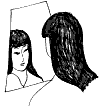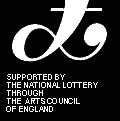
WRITE
Can you rewrite this haiku in a consistent style of language?
Two hands to scour my wings,
two to scrub my eyes
and two to establish a relatively stable foothold.

CRITICAL REFLECTION
Flies do not speak like civil servants, of course. They use street slang! As you will have noticed, the phrase "establish a relatively stable foothold" is not in the same direct and monosyllabic language as the first two-thirds of the poem. It appears to have crept into the fly’s speech patterns from some official report. If you changed the last phrase to something more direct and punchy, like "and two to grip," or "and two to hold on," you are on the right lines and should congratulate yourself.
Did you want to change "hands"? Both "hands" and "feet" seem to me equally non-insect words, though the six limbs of a fly are usually called "legs" and the ends of them therefore ought to be "feet," perhaps. Make your own choice. If you don’t like either you could do without, and just say "Two." This gives the reader more to do, which is often a good thing.

WRITE
Write an original haiku of your own in the voice of a creature or an object.

READ
Is creative writing full of adjectives?
A
How terribly sad –
our cruel fate is to end
as crumbled, rotting compost
B
How sad it is –
the way a person ends
as compost for caneshoots
A
As the great old trees
are marked for felling, the birds
build their new spring nests
B
As great trees
are marked for felling
birds build their nests
A
Pure white plum blossoms
slowly begin to turn
the colour of dawn
B
Plum blossoms
begin to turn
the colour of dawn
A
Lying ill on a journey –
my feverish dreams ceaselessly
roam wild waste moors
B
Ill on a journey –
dreams roam
parched moors

CRITICAL REFLECTION
There is a thoughtless old myth around that you can "improve your style" by injecting lots of ambitious adjectives and adverbs into your prose and poetry to spice it up, to make it "more descriptive." This is a grave error. Examine the lovely prose of Jane Austin. There is hardly an adjective or adverb anywhere. No. The strength of good style comes from nouns first, verbs next. Adjectives and adverbs get in the way and clutter it up, blunting the effect, unless used very sparingly.
"How sad …"
In the first pair of A and B translations, "How sad …," (a poem of Basho’s in two versions) what is the effect of adding "terribly" to sad, "cruel" to fate, and "crumbled, rotting" to compost? It might be supposed that it would make the experience of reading it more intense, more moving and more vivid. Words like "terribly" and "cruel" are intensifiers, after all, whose function is to wind up the emotional temperature. Words like "crumbled" and "rotting" should bring our fate sharply before the eyes of our imagination in all its awful vividness. But it does not work, does it? The B version is more moving. The subject stands out clearly and in simple elegance, without breast-beating and wailing and gnashing of teeth, and is all the more effective for it. At least, I think so!
"As great trees …"
The second pair are also translations of a Basho poem. The point of the poem is surely the sad fate of the nest-building birds, which they know nothing about. Adding "new, spring" to nests in the last line distracts the reader from this theme by going off into an imaginative focus on the nests themselves. It does not seem to me to be an improvement. What did you think?
"Plum blossoms …"
What could be more lovely than the bare essence of this delicate observation, in the B version? The adverb "slowly" adds little, and muddies the clear water of the statement. The adjectives "pure, white" officiously give information only needed by readers who do not know what plum blossoms are. I think the second version is to be preferred.
"Ill on a journey …"
Here perhaps there are good reasons for using more adjectives and adverbs: the feverish and wandering state of mind is enacted by a restless tumble of words. I still prefer the very short version, but I concede that you could like A and still be a person of taste of judgement.
We have been considering the contribution of adjectives and adverbs to clarity and vividness, and discovered that they often have disadvantages that outweigh what they can add in the way of colour and precision to the image. We have not considered the rhythmic issues in the examples given, but there is obviously a judgement to be made by the ear in these examples. Do you want the restless tumble of words, or do you want the despairing torpor of the four heavy unrelieved stresses in the last two lines of the B version? I would vote for the four leaden beats, but a good case could be made for the alternative kind of rhythm.
The conclusion, anyway, is that …
Lots of adjectives are not necessarily a Good Thing
Re-sequencing the lines

READ
Look at the following versions of a poem.
Doves
On bare branches
two grey doves
fluffed up
(by Francine Plunkett)
What happens if I switch the lines?
Fluffed up
two grey doves
on bare branches
And look at these two.
Wintry sun
over the deserted funfair
a gull, soaring
(by Michael Gunton)
If one switches the sequence of the lines, how does it change the emotional effect?
A gull, soaring
over the deserted funfair
wintry sun

CRITICAL REFLECTION
The last image tends to dominate emotionally, doesn’t it? If the last line is "soaring," the whole poem is more upbeat than if the last line is "wintry sun." If the last line is "fluffed up," the whole poem is more upbeat than if the last line is "bare branches." Remember this when you are stuck on your own poems: you can often move lines from one place to another and it will change the effect (this is particularly useful in rhyming verse; you want the strong rhyme in the last line of the stanza, and the weaker one earlier, to prepare for it, so, if they are the wrong way round, switch them).


